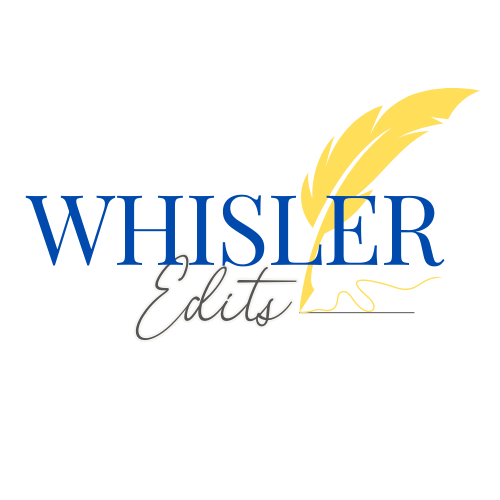Whisler Edits Blog

Why Your Writing Muse Isn't Your Friend
Discover in this post …
what happens when you wait for the muse’s return.
what happens when you don’t.
how to carry on with your story … with or without the muse.
Goodbye, Lovely Muse
Years ago, a writer told me he’d lost his muse—and he was downright frustrated about it.
He said that the loss of his muse was, in fact, the source of all his writing problems. “If only I had my muse back,” he grumbled, “I’d be fine. I’d be writing every day, moving forward, feeling creative and inspired.”
He shared with me snippets of his past in which he’d been living just such a life, one of passion and purpose. His nostalgia was so strong that it was all he could focus on.
Months went by, and the writer and I occasionally kept in touch. I asked him where he was with his writing, and his answer usually included a vigorous fist-shaking at that elusive muse, who still hadn’t chosen to return. He had other priorities too—his finances, his health. But overall, he blamed his lack of writing on his “friend” choosing to abandon him.
I found his story incredibly sad.
He had allowed the muse’s retreat to dictate his entire writing life. With that view, he would never be able to step back into his writing by himself.
He would always be waiting. Always hoping for the muse’s return.
That Darn Tricky Brain Again
I think the muse deserves a name, don’t you?
Let’s call her Clara.

Some of us are sitting around waiting for Clara to reenter our lives. (Can you picture it? You’re alone, nursing a glass of wine, when Clara pushes open saloon doors, her hair and scarves blowing in the wind. She strides across the room and throws her arms around you after years of silence.)
If this is you, waiting for just such a moment, I have good news: You don’t need Clara.
Your brain might think you do. Your brain might tell you that to accomplish your very best writing, you need to feel that sense of wonder and excitement that comes from fleshing out a new idea, something truly magnificent.
But your brain tells you lots of things that aren’t true. Have you ever noticed that?
It makes perfect sense. After all, your brain’s job is to keep you safe. It wants you to seek out pleasure and avoid risk. The “avoid risk” part works well when you spot a bear in the woods—when there’s actual danger creeping up on you.
But it doesn’t work so well when you’re tempted to stay exactly where you are on your writing journey. When your brain tells you that it’s fine to wait and maintain the status quo. When it whispers in your ear, "You should let the fields lie fallow for a bit."
We can’t always take our brain’s advice as law, especially in cases where the story our brain is telling us contrasts where we say we want to go. For example, if you say you want to finish your novel, and your brain is saying that the best way to do that is to just relax and wait for inspiration, I would question that advice.
Here’s the simple way I recommend making life decisions: Choose actions that align with your overall goal.
So if your goal is to finish your draft, will waiting and not writing take you there?
Spoiler alert: It won’t.
Hello, Momentum
So to finish your draft and write something decent, you don’t need Clara.
Let me tell you about a recent conversation I had with another writer, a former client of mine who was having trouble wrapping up all the threads around her main character at the end of her story. She told me in retrospect, “For the life of me, I couldn’t see how I was going to pull it all off.”
But she did pull it off. And because she was so excited, and she knew I would understand, she immediately messaged me and told me the story of how she managed to weave the threads into place.
“I wrote a scene,” she told me, “that I ended up deleting because it wasn’t right. Then, just as I was there, something clicked. It was so perfect, like every question that I still had about certain things that had come up throughout the series—all of it makes total sense.”
I knew the feeling she was talking about—that “eureka” moment that you’re desperately hoping will come to you so you can tie things together. It’s exactly what every writer hopes for when they run into this type of problem.
But did you notice her exact words?
She wrote a scene that wasn’t right. Then, “just as I was there, something clicked.”
She didn’t say she brainstormed for days on end about how to wrap everything up. She didn’t sit and stare at her computer, waiting for inspiration to strike.
She was in the middle of actually writing when inspiration came.

Anyone who’s a member of my Facebook group for fantasy writers might already be familiar with the Louis L’Amour quote in my cover photo: “Start writing no matter what. The water does not flow until the faucet is turned on.”
If you sit around waiting for inspiration, you might wait forever.
(Now, if you're unsure what to write and would like to uncover the specific reason you're "not feeling" your story, I recommend taking a look at this previous post of mine that will help you identify what's really going on and provide some specific strategies to help.)
Taking action and writing is the exact path toward summoning inspiration. I’ve heard it time and time again from my clients. The moment they stop worrying whether they’ll ever fix their current plot problem, or what’s going to happen at the end of their story, and they write through it, the problem tends to resolve itself.
Not through hope and inaction, but through the (dare we say magical?) act of writing.
Get Started without the Muse
I’m a huge fan of goals (mostly because I’ve seen the effects of them), and until you set a specific writing goal you’re trying to accomplish, you’re likely to wander aimlessly in the dark. So ask yourself, “Is it my current goal to move forward in my story? Do I want to make progress in my draft?”
If that’s your priority, and you love your reasons for it, jot down the actions you’re currently taking that lead you in the direction you claim you want to go. Some helpful questions you can ask to get started include …
Have I set aside specific time to write that’s separate from all other tasks?
Do I have a place to write that’s devoid of distractions?
What specific writing goal am I pursuing? Do I want to flesh out a basic outline? Write Chapter 1?
Once you give your brain the exact goal you’re moving toward (and it can help to get super visual here—picture yourself sitting down at the keyboard, typing words, drinking a sip of coffee, celebrating when you finish your chapter), take action in the direction of that goal.

Don’t wait. Just do it. (Hey there, Nike!)
Remember—an object in motion stays in motion. You don’t need the muse to create your own momentum.
(Speaking of momentum, if you're looking for extra tips, I wrote a post around that topic. You can read it here.)
Start writing on your own. Maybe Clara will show up. Maybe she won’t. But you’ll no longer be waiting on her to burst through the door and bless you with her presence. Whether she appears right away or not, you’ll be writing your story instead of waiting for one.
I’d love to know how the writing muse affects your own life. Do you feel that your writing is dictated by the appearance or disappearance of the muse? Do you take action even on days when you don’t feel like it? Email me anytime at [email protected] and let me know!
Do you want to learn how to write a story that makes your target readers stand up and cheer? If you’d like support from A to Z (from brainstorming to drafting to revising to publication), book a Discovery Call with me to see if you’re a good fit to join my book coaching program, Fantasy Footsteps: Road to Publication. And if you haven’t done so already, grab your Free Guide on how to hook readers from your story’s start!


